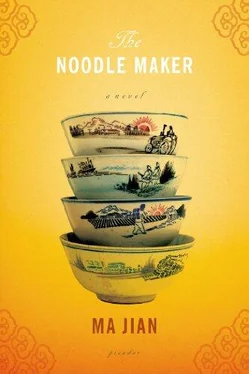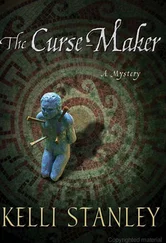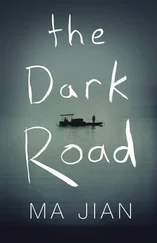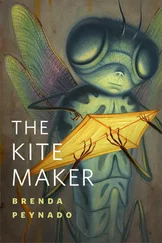When the fifty-third corpse was cremated, the furnace’s fire-proof window shattered. The entrepreneur couldn’t afford to replace the window, so he blocked it up with bricks. After that, he could no longer enjoy the sight of bodies being consumed by the flames, and had to rely on his experience to judge the correct timing. He always gave an extra seven minutes to anyone over the standard one-hundred-and-thirty kilogram weight, at no additional cost.
His crematorium had several advantages over the state-run incinerators. First, the corpses could enter the flames while swooning to the sound of their favourite piece of music. The entrepreneur could provide them with any music they requested, including all the unwholesome tunes that were banned by the Party. If the deceased had grown up in the 1930s, he would play the decadent songs ‘When Will My Prince Come Back?’ or ‘Pretty Girls in Peach Blossom River’.
Admittedly, his prices were higher than the public crematoriums. He had to pay electricity bills and taxes, after all. But the dead were guaranteed a same-day burning. With state-run operations, the body waited at least a week for a cremation, over two weeks if it hit a busy period. Relatives had to pay for the body storage, and were often reduced to slipping back handers to officials in an attempt to speed the process up. When these additional costs were taken into account, the crematorium worked out as quite good value. But the greatest advantage of choosing the Swooners’ Crematorium, as the entrepreneur called it, was that the company sent a car to collect the body from the house, saving the family the trouble of finding their own transport. The relatives of the deceased could set up a modest wake at home, dispatch someone to the crematorium’s liaison office in the centre of town to sort out the formalities, and that was it. When the body was collected later in the day the relatives could shed a few tears, then return to their lives as normal. With state-run operations, the proceedings dragged on so long that the relatives were almost reduced to corpses themselves.
The liaison office of the Swooners’ Crematorium was a long narrow shed built in the entrance passage of an old building in the centre of town. The relatives visited the office to register the death, plan the cremation and buy the clothes and daily necessities the deceased would require in the Land of the Dead. The entrepreneur lived in this office with his mother. They were a great team. Their business flourished. Although his mother had very little knowledge of electricity (the entrepreneur was an electrician by trade), she knew all there was to know about the dead. They only saw each other at night. During the day, the mother looked after business in the office while the son travelled to the crematorium in the suburbs to deal with the dead bodies. He left the office at nine in the morning, and was rarely back before midnight.
At night, the two colleagues would meet in the long shed that occupied half the entrance passage of the building. When the son returned, the mother would sit on the bed sorting out the burial clothes he had retrieved from the bodies, and listen to what he had to say.
‘Women burn more easily,’ he told her one night. ‘For someone as skinny as you, eight hundred degrees would be enough to get your flesh to fall from the bone.’
‘What do you mean, fall from the bone?’ she asked, glancing at the walls whose lower halves were painted pink — a colour that had only been available in the shops since the launch of the Open Door Policy.
‘It’s just like when you cook spare-ribs. When the temperature is high enough, the flesh just falls from the bone.’
‘I think my leg is rotting. I should have cut out this boil long ago.’ The mother’s shadow on the pink wall behind her looked like a creature from another planet. ‘You got your bones from me and your flesh from your father,’ she said, lowering her gaze. She always avoided looking her son in the eye.
‘That’s why I’m so short,’ he replied.
‘It’s your father’s fault you can’t find a woman. He had an unlucky face.’
‘I know a lot about women,’ the entrepreneur said indignantly. ‘Most of them like to listen to piano music before they go into the oven.’
‘What do men like to listen to?’ The mother snatched a piece of old cloth she spotted lying on the corner of the bed, then folded it neatly and returned it to its place.
‘Symphonies.’ The son swung his bony legs. ‘Men are tough brutes. Only strong, powerful music can send them into a swoon.’
‘Men are animals. Don’t waste your time playing music to them,’ the mother snarled, reaching for a pair of dark woollen trousers.
‘Everyone needs to swoon before they go.’ All the neighbours knew that the entrepreneur was a great lover of music. After the Open Door Policy was launched, he was the first man in town brave enough to walk down the streets swinging a cassette player in his hand. The entrepreneur jumped up from his seat and threw his hand in the air. His hand’s shadow was moving too. ‘I always make sure they swoon. I’ve heard that unless the dead swoon before they go, their souls won’t rise to heaven and their bodies won’t burn properly. Swooning allows them to vanish from this world for ever.’
The mother’s shadow looked very dark against the clean pink wall. ‘Look, here’s another hole you’ve made,’ she growled. Every object in the room was second-hand: the table, the sheets, every stitch of cloth on her body. She sat on the bed watching her son pace back and forth. The room was two metres by ten, and had an arched ceiling. In the light of the fire, she could see the traces of white ash, or ash-like substance, clinging like ghosts to the red bricks at the top of the walls. The entrance passage smelt as bad as a public bathhouse. Most of the stench came from the stall-holder who sold fermented bean curd outside the front gate. If their front door was left open during the day, the smells would flow straight in.
The office looked cheerful and festive when one glimpsed it from the street. There was always loud music playing, and large displays of paper flowers, paper shoes, imperial hats and Western suits and ties (the manufacture of which had only been permitted since the introduction of the Open Door Policy). The paper money, paper horses and paper flowers were brand new, but all the burial clothes were second-hand. The entrepreneur would never have been so wasteful as to send a body into the oven with its burial clothes still on. He would leave the clothes on the corpse until the last minute, in case the relatives turned up to bid a last goodbye, then he would carefully remove them, fold them up and bring them back to the office. His mother would howl in despair if she discovered he had inadvertently ripped the cloth or torn off a button. When she sold the burial clothes on to the next family, she was always generous enough to knock the price down a little.
From a distance (or from the town’s highest clock tower), the long narrow shed looked as bright as an open eye. When he first set up business there, the entrepreneur invited the most talented artist in town, a member of the ‘Wild Beast’ school apparently, to paint a large mural along the shed’s outside wall. He paid him fifty yuan for it. At first, the artist was reluctant to fix his art onto a wall: he believed that art and beauty were fluid concepts, and encompassed activities such as pissing, burping, spitting and fondling women and bottles of beer. But the entrepreneur was persistent, and at last persuaded him to paint a scene of a girl with golden hair burning to death to the sound of beautiful music. Instead of the metal tray, he painted her lying on an imported Western Dream mattress, and squiggled a few lines below to indicate an electric grill. One look at the girl’s smile and softly protruding breasts (which exceeded the maximum cup-size allowed by the Open Door Policy’s poster regulations) and you could die a happy man.
Читать дальше












